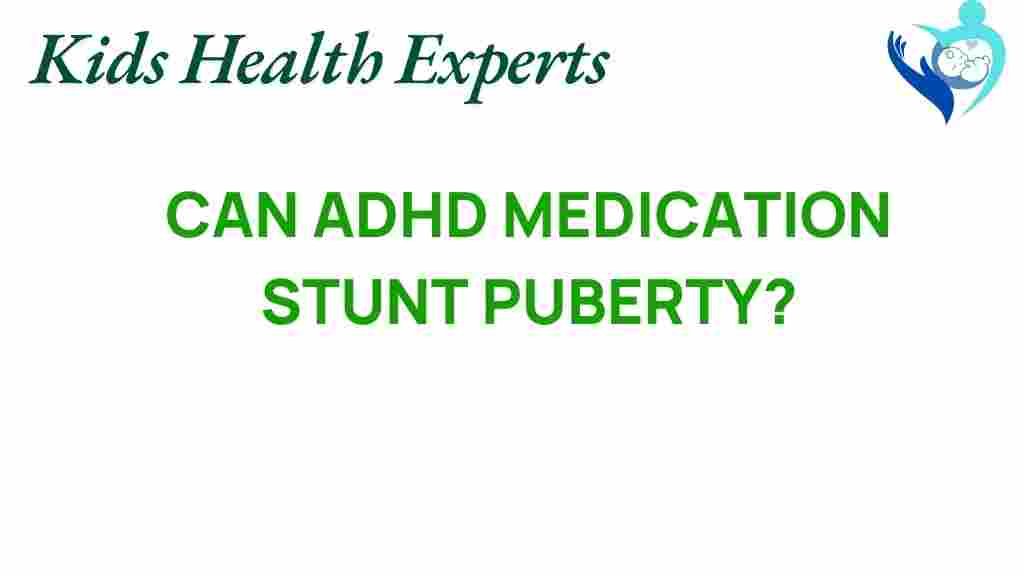The Impact of ADHD Medication on Puberty: What Parents Should Know
As children transition into adolescence, they face numerous changes, both physically and emotionally. For those diagnosed with Attention Deficit Hyperactivity Disorder (ADHD), the journey through puberty can be further complicated by the effects of medication. Understanding how ADHD medications influence puberty is crucial for parents and guardians. This article will explore the effects of ADHD medication on child development during puberty, examining mental health aspects, potential side effects, and offering parental guidance.
Understanding ADHD and Its Treatment
ADHD is a neurodevelopmental disorder that affects a child’s ability to focus, control impulses, and regulate their energy levels. Treatment often involves a combination of behavioral therapies and medication. Common medications prescribed for ADHD include stimulants like methylphenidate and amphetamines, as well as non-stimulant options like atomoxetine.
How ADHD Medication Works
ADHD medications primarily work by altering the levels of neurotransmitters in the brain, specifically dopamine and norepinephrine. This adjustment helps improve attention span, focus, and impulse control. However, the introduction of these medications can have varying effects on the developing body, especially during puberty.
The Intersection of Puberty and Medication Effects
Puberty is a critical period of growth and development that involves significant hormonal changes. These changes can impact a child’s mental health, behavior, and overall development. When ADHD medication is introduced during this time, several factors may come into play:
- Hormonal Changes: Hormones such as estrogen and testosterone can influence how a child responds to ADHD medications.
- Physical Growth: Medications may affect appetite and weight, which are crucial during this growth phase.
- Mental Health: ADHD symptoms can exacerbate anxiety and depression during puberty, making effective treatment essential.
Potential Effects of ADHD Medication on Puberty
Here are some potential effects of ADHD medication on a child’s development during puberty:
- Appetite Suppression: Stimulant medications can reduce appetite, which may lead to weight loss or nutritional deficiencies.
- Growth Delays: Some studies suggest that long-term stimulant use may be associated with slower growth rates, although this effect is often temporary.
- Mood Fluctuations: Changes in mood or emotional regulation can occur, potentially impacting social relationships.
- Sleep Disturbances: Medications may affect sleep patterns, leading to insomnia or daytime sleepiness.
Parental Guidance: Monitoring and Support
As a parent, it’s essential to actively monitor your child’s response to ADHD medication during puberty. Here are some steps for effective parental guidance:
1. Open Communication
Ensure that your child feels comfortable discussing their feelings, side effects, and any challenges they encounter while taking medication. This open dialogue fosters trust and allows for timely interventions.
2. Regular Check-ups
Schedule regular appointments with your child’s healthcare provider to assess the effectiveness of the medication and monitor growth and development. This is especially important during puberty when rapid changes occur.
3. Observe Behavioral Changes
Keep track of any behavioral changes that may arise after starting medication. Look for signs of increased anxiety, mood swings, or changes in social interactions.
4. Encourage Healthy Habits
Promote a balanced diet, regular physical activity, and adequate sleep. These factors can help mitigate some side effects of ADHD medications and support overall health during puberty.
5. Consider Therapy
Cognitive-behavioral therapy (CBT) and other therapeutic approaches can be beneficial for addressing emotional and behavioral challenges that may arise during this transitional phase.
Side Effects of ADHD Medication During Puberty
While ADHD medications can provide significant benefits, they can also lead to side effects that parents should be aware of:
- Common Side Effects:
- Loss of appetite
- Insomnia
- Headaches
- Stomachaches
- Less Common but Serious Side Effects:
- Heart problems
- Psychiatric issues, such as increased anxiety or depression
- Growth suppression
If any severe side effects are observed, parents should contact their healthcare provider immediately.
Troubleshooting Tips for Parents
Here are some troubleshooting tips for parents navigating the complexities of ADHD medication during puberty:
1. Keep a Medication Journal
Document your child’s medication schedule, dosages, and any side effects observed. This information can be invaluable during doctor visits.
2. Collaborate with Healthcare Providers
Work closely with your child’s healthcare team to adjust medications if necessary. Sometimes, finding the right balance may require trial and error.
3. Educate Your Child
Help your child understand their condition and the importance of medication. This knowledge can empower them to take an active role in their treatment.
4. Seek Support
Connect with other parents of children with ADHD. Sharing experiences can provide insights and emotional support.
5. Stay Informed
Keep up with the latest research and resources. Websites like CHADD offer valuable information about ADHD and treatment options.
Conclusion
Navigating the impact of ADHD medication on puberty requires careful consideration and proactive parenting. By maintaining open communication, monitoring side effects, and providing support, parents can help their children manage ADHD symptoms while also experiencing healthy growth and development during this critical stage of life. Understanding the intersection of ADHD, puberty, and medication effects is essential for fostering mental health and ensuring that children receive the treatment they need to thrive.
For more information on ADHD treatment options and parental support, consider visiting this resource.
This article is in the category Conditions and created by KidsHealthExperts Team
